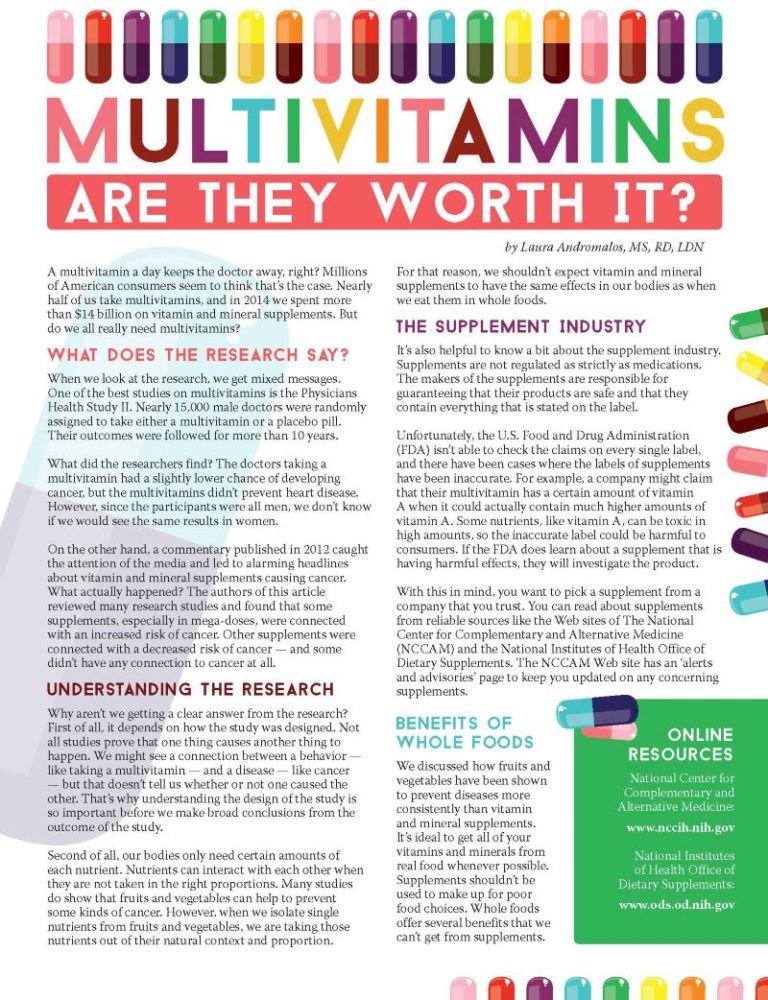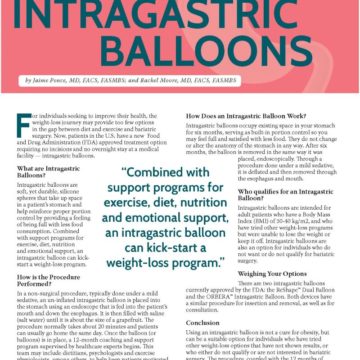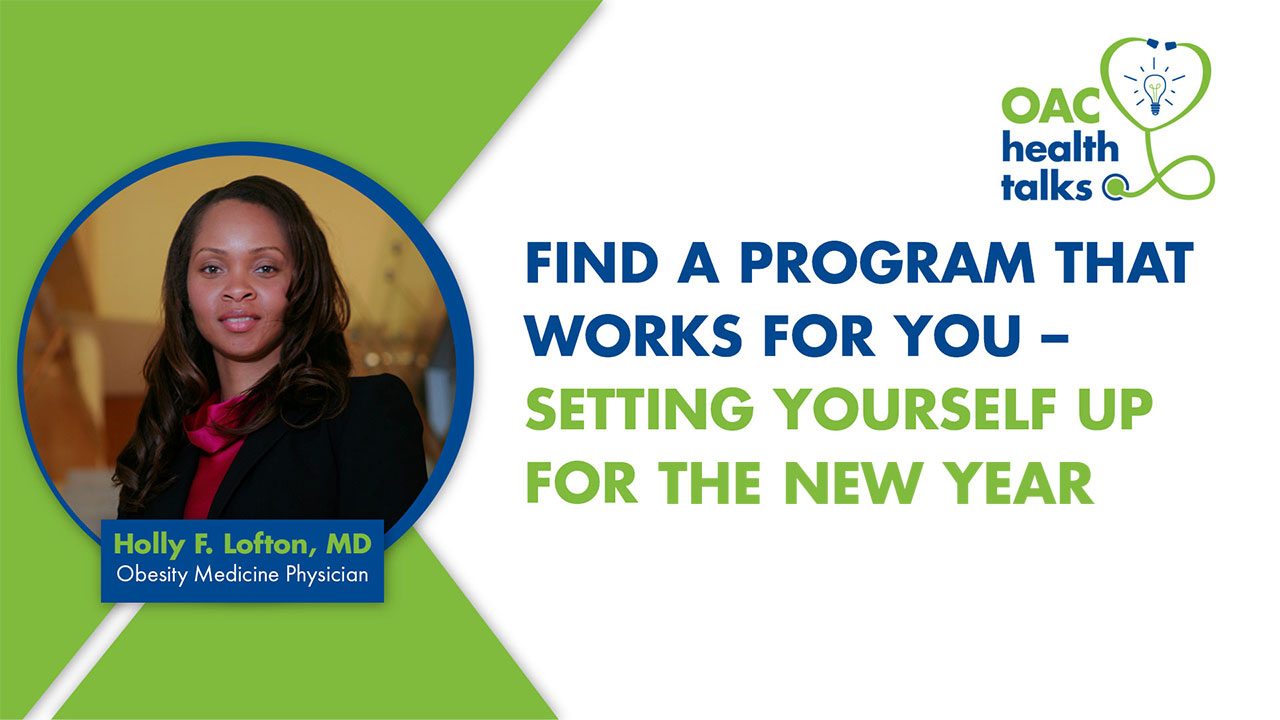Multivitamins: Are They Worth It?


by Laura Andromalos, MS, RD, LDN
Fall 2015
A multivitamin a day keeps the doctor away, right? Millions of American consumers seem to think that’s the case. Nearly half of us take multivitamins, and in 2014 we spent more than $14 billion on vitamin and mineral supplements. But do we all really need multivitamins?
What Does the Research Say?
When we look at the research, we get mixed messages. One of the best studies on multivitamins is the Physicians Health Study II. Nearly 15,000 male doctors were randomly assigned to take either a multivitamin or a placebo pill. Their outcomes were followed for more than 10 years.
What did the researchers find? The doctors taking a multivitamin had a slightly lower chance of developing cancer, but the multivitamins didn’t prevent heart disease. However, since the participants were all men, we don’t know if we would see the same results in women.
On the other hand, a commentary published in 2012 caught the attention of the media and led to alarming headlines about vitamin and mineral supplements causing cancer. What actually happened? The authors of this article reviewed many research studies and found that some supplements, especially in mega-doses, were connected with an increased risk of cancer. Other supplements were connected with a decreased risk of cancer — and some didn’t have any connection to cancer at all.
Understanding the Research
Why aren’t we getting a clear answer from the research? First of all, it depends on how the study was designed. Not all studies prove that one thing causes another thing to happen. We might see a connection between a behavior — like taking a multivitamin — and a disease — like cancer — but that doesn’t tell us whether or not one caused the other. That’s why understanding the design of the study is so important before we make broad conclusions from the outcome of the study.
Second of all, our bodies only need certain amounts of each nutrient. Nutrients can interact with each other when they are not taken in the right proportions. Many studies do show that fruits and vegetables can help to prevent some kinds of cancer. However, when we isolate single nutrients from fruits and vegetables, we are taking those nutrients out of their natural context and proportion.
For that reason, we shouldn’t expect vitamin and mineral supplements to have the same effects in our bodies as when we eat them in whole foods.
The Supplement Industry
It’s also helpful to know a bit about the supplement industry. Supplements are not regulated as strictly as medications. The makers of the supplements are responsible for guaranteeing that their products are safe and that they contain everything that is stated on the label.
Unfortunately, the U.S. Food and Drug Administration (FDA) isn’t able to check the claims on every single label, and there have been cases where the labels of supplements have been inaccurate. For example, a company might claim that their multivitamin has a certain amount of vitamin A when it could actually contain much higher amounts of vitamin A. Some nutrients, like vitamin A, can be toxic in high amounts, so the inaccurate label could be harmful to consumers. If the FDA does learn about a supplement that is having harmful effects, they will investigate the product.
With this in mind, you want to pick a supplement from a company that you trust. You can read about supplements from reliable sources like the Web sites of The National Center for Complementary and Alternative Medicine (NCCAM) and the National Institutes of Health Office of Dietary Supplements. The NCCAM Web site has an ‘alerts and advisories’ page to keep you updated on any concerning supplements.
Benefits of Whole Foods
We discussed how fruits and vegetables have been shown to prevent diseases more consistently than vitamin and mineral supplements. It’s ideal to get all of your vitamins and minerals from real food whenever possible. Supplements shouldn’t be used to make up for poor food choices. Whole foods offer several benefits that we can’t get from supplements.
Benefits from Whole Foods
A complex combination of vitamins and minerals: While we think of oranges as a great source of vitamin C and bananas as a great source of potassium, the truth is that every whole food has a variety of vitamins and minerals that work in combination to provide health benefits.
Fiber: Fruits, vegetables and whole grains provide us with fiber that keeps our digestive system healthy and can prevent some diseases such as type 2 diabetes and heart disease.
Phytochemicals and Antioxidants: Beyond vitamins and minerals, plants contain special compounds that can protect our bodies from some diseases and can slow the aging process.
When we reduce foods to just the vitamins, minerals, phytochemicals and antioxidants that they contain, we are missing the big picture. Whole foods contain all of these compounds in unique proportions that we can’t replicate with supplements. However, we also need to remember that not everyone can get all of their vitamins and minerals from their diet alone.
Who Needs Supplements?
If you are a healthy person who eats a balanced diet, there probably isn’t much to gain from taking a multivitamin. However there are some groups of people who do benefit from supplements:
- Pregnant and breastfeeding women
- People who have had surgery on their digestive tract, such as bariatric surgery patients
- People with medical conditions that affect their body’s ability to absorb vitamins and minerals
- People who eat a limited variety of foods or have eliminated entire food groups, such as people with vegetarian or vegan diets
- Adults over the age of 50 may need additional vitamin B12
If you fall into one of those groups, discuss your supplement needs with your healthcare provider.
How to Select a Supplement
If you do need a supplement, how do you choose one? Scanning the shelves at the drug store feels like being in the wild west of supplements. Here are some guidelines to keep in mind:
- Check with your healthcare provider. They should be able to give you guidance on a dose and even a brand to help you pick the right supplement. At our bariatric surgery program, we provide patients with a shopping guide to help them make the best choices.
- More is not always better. Our bodies only need so much of each vitamin and mineral and we can overdose on some nutrients. In addition, some nutrients block others from being absorbed. Taking mega-doses is not a good idea unless you are being treated by your healthcare provider for a vitamin or mineral deficiency.
- Be specific. If you have just one deficiency, such as an iron deficiency, supplement just that nutrient. You don’t need to treat a single nutrient deficiency with a multivitamin.
- Pick a brand you trust. Since the supplement manufacturers are responsible for ensuring their products are safe and their labels are accurate, you should pick a company that you trust.
Summary
While a multivitamin can’t replace healthy habits and good food choices, some people do benefit from taking a multivitamin or supplementing certain vitamins and minerals. If you think you might benefit from a supplement, discuss your needs with your healthcare provider. But if you are a healthy adult, it’s probably an apple a day — not a multivitamin a day — that keeps the doctor away.
Online Resources
Visit the National Center for Complementary and Alternative Medicine’s Web site by clicking here.
Visit the National Institutes of Health Office of Dietary Supplements’s Web site by CLICKING HERE.
About the Author:
Laura Andromalos, MS, RD, LDN, has been helping bariatric patients achieve their health goals for more than six years. She is the Bariatric Nutrition Coordinator at Brigham and Women’s Hospital in Boston. She has degrees from Cornell University and Boston University and completed her dietetic internship at the Mayo Clinic in Florida. She enjoys keeping updated with the latest research and helping patients understand the science behind the headlines.
by Sarah Muntel, RD Spring 2024 Spring has sprung, bringing sunnier and warmer days! For many, this…
Read Articleby Nina Crowley, PhD, RD (with Inspiration from Shawn Cochran) Winter 2024 Dating, no matter your age,…
Read ArticleWith the holidays behind us and 2022 now here, many of us are ready to tackle our…
View Video










